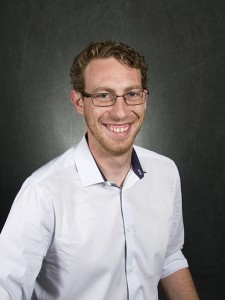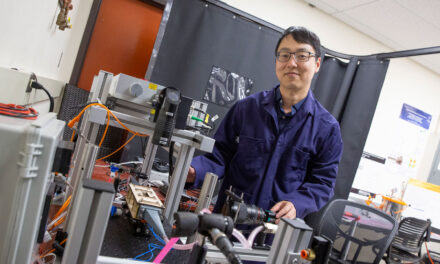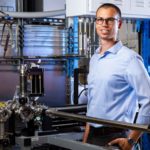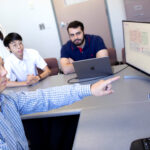
EPA fellowship aids student’s research for safer use of nanotechnology

Engineering doctoral student Ben Wender is studying how society can realize benefits from emerging nanotechnologies while reducing or alleviating potentially detrimental impacts.
We live in a world increasingly made of nanoparticles. The tiny, engineered materials are commonly used in consumer products, including clothes, in manufacturing and industrial processes and in new “nano-enabled” technologies.
While they enhance products, processes and tech devices, there are many unanswered questions about the environmental impacts of nanomaterials.
Ben Wender aspires to help ensure a nanoworld will bring more benefits than risks to society and the environment.
He’s pursuing that goal through his research as a doctoral student in the School of Sustainable Engineering and the Built Environment, one of the Ira A. Fulton Schools of Engineering at Arizona State University.
Wender’s work will get a boost through a U.S. Environmental Protection Agency STAR (Science to Achieve Results) program fellowship that provides support for environmental engineering and science to serve national interests.
The award offers about $42,000 a year for up to three years to pursue graduate studies and research.
Wender will work with materials scientists and environmental engineers to apply life-cycle assessment to rapidly developing nanotechnologies — understanding how they are made, how they improve product performance, where they end up and what effects they might have on land, water and humans.
“We need to develop more effective tools for analyzing environmental tradeoffs so we can create new technologies that reduce environmental impacts while enabling improved services,” he said.
To do this he creates new life-cycle assessment methods to compare the benefits provided by emerging nano-enabled technologies with their uncertain human and environmental health impacts.
“We need to consider nanotechnologies from a life-cycle perspective. For example, you might be able to use nanotechnology to make a car battery that reduces the vehicle’s greenhouse gas emissions by making it lighter and more efficient,” he explains. “However, if the manufacturing of those nanomaterials consumes significant energy and releases more carbon dioxide than is saved during car use, then there is no net life-cycle greenhouse gas benefit.”
Wender has been gaining the experience to pursue solutions to such challenges through a variety of endeavors.
For three years, he’s been a graduate research fellow with Center for Nanotechnology in Society at ASU, which explores societal issues related to the emergence of nanotechnology.
He has studied how to incorporate social science research methods like scenario development and stakeholder engagement into life-cycle assessment, and recently how life-cycle assessment can contribute to responsible innovation practices.
Since January 2012 he has worked with the ASU-based Quantum Energy and Sustainable Solar Technologies (QESST) Engineering Research Center, where he served as Student Leadership Council president and coordinated the environmental sustainability research team.
Outside of the university, Wender has participated in research internships at Los Alamos National Laboratory, the Eco-assessment Center of Excellence at GE (General Electric) Global Research headquarters, and with the U.S. Army Corps of Engineers Risk and Decision Science environmental laboratory.
While the internship experiences have been helpful, Wender said he has always been glad to return to ASU, where the research environment is conducive to pursuing innovation.
“My research at ASU positions me at the interface between social science, environmental engineering, and materials and technology development,” he said.
“I have been able to assemble a large network of experts across numerous departments at ASU that leads to interactions and knowledge sharing that wouldn’t be possible at other institutions, and ultimately will lead to innovation that results in better technologies with reduced environmental impacts.”
Media Contact
Joe Kullman, [email protected]
480-965-8122
Ira A. Fulton Schools of Engineering



































